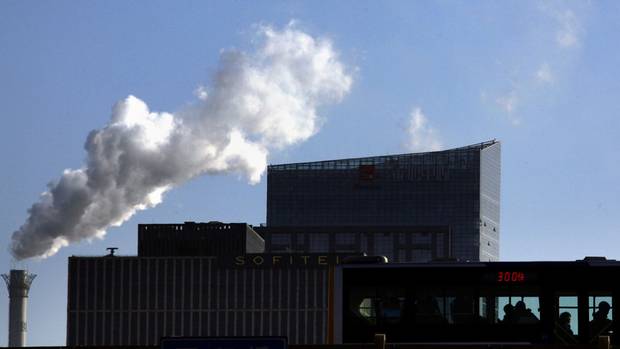Climate Summit Was a Pathetic Exercise in Deceit
Globe and Mail
It was an “emperor-has-no-clothes” moment. The 17-year-old youth delegate rose before the assembled participants at the Durban climate conference and looked them straight in the eye.
“I speak for more than half the world’s population,” declared Anjali Appadurai of Maine’s College of the Atlantic. “We are the silent majority. You’ve given us a seat in this hall, but our interests are not at the table. What does it take to get a stake in this game? Lobbyists? Corporate influence? Money?”
“You have been negotiating all of my life. In that time, you’ve failed to meet pledges, you’ve missed targets, and you’ve broken promises.”
Ms. Appadurai nailed it. There’s really only one label for the pathetic exercise we’ve just witnessed in South Africa: deceit. The whole climate-change negotiation process and the larger political discourse surrounding this horrible problem is a drawn-out and elaborate exercise in lying—to each other, to ourselves, and especially to our children. And the lies are starting to corrupt our civilization from inside out.
The climate negotiators lie to each other and the world when they claim the world can still limit the planet’s warming to two degrees Celsius above the pre-industrial average, the point at which many experts believe the risks from climate change rise sharply.
It’s a lie because we’ve already experienced 0.8 degrees warming, and we’ve got at least another 0.6 degrees on the way due to carbon already in the atmosphere. Given that global carbon dioxide emissions of about 35 billion tons each year are now growing at an average of 3 percent a year—which means they’re doubling every twenty three years—it’s virtually certain we’re going to use up the remaining 0.6 degrees of leeway. In fact, the emerging consensus among climate experts is that we’ll be lucky to limit warming to 4 degrees.
India, China, and Brazil lie to their own citizens when they claim that by blocking a climate deal they’re protecting the opportunity for their economies to develop. “Am I to write a blank check and sign away the livelihoods and sustainability of 1.2 billion Indians?” asked India’s environment minister, Jananthi Natarajan.
But this choice is patently false, as senior officials of these countries surely know. It’s not a choice between a climate-change deal and economic development; it’s really a choice of both or neither. If we don’t reduce carbon emissions, the impacts of climate change will eventually devastate the economies of poor countries. Repeated failures of monsoons in India and China or the desiccation of the Amazon basin in Brazil will drive a stake through these countries’ economies. Dealing with climate change is a prerequisite for prosperity this century—for all people on this planet.
The Canadian federal government lies to Canadians when it says we can still meet the government’s stated target of a 17 percent reduction of emissions below the country’s 2005 level by 2020. Given the projected growth in oil sands output and the Conservatives malign neglect of the climate change file, nobody in the know seriously believes such a target can be achieved.
And we lie to ourselves when we tell ourselves that fixing climate change is someone else’s responsibility, or that the science is too uncertain to justify action, or that we’ll find a technology to solve the problem when it gets serious enough, or that it simply costs too much to do anything.
But most of all we lie to our kids. We tell them we’ve got the climate problem under control, while we’ve actually lost control of it completely. Worse, we tell them that we’re protecting their options for the future, while we’re actually closing down those options to protect powerful political and economic vested interests in the present.
It took a 17 year old to tell the truth. The rest of us, supposedly adults, should be ashamed.
Erratum: Ms. Appaduri was 21 years old at the time of the Durban meeting, not 17 years old as was widely reported in the hours after her speech.

Topics
Climate Change
Energy
Environmental Stress and Conflict
